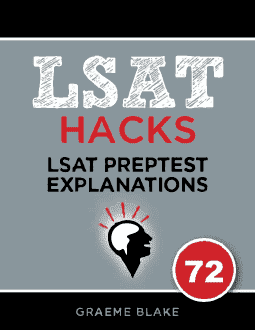QUESTION TEXT: Sanderson intentionally did not tell his cousin…
QUESTION TYPE: Necessary Assumption
CONCLUSION: It was wrong for Sanderson not to tell his cousin about the rumor he overheard.
REASONING: It is wrong to mislead someone, whether it’s from lying or from withholding information.
ANALYSIS: This question tries to drown you in words. It states some obvious facts about lying, but uses three times the words required.
All of this is distract you from the omission the argument made. We don’t know if Sanderson actually believes the plant will close! He just overheard someone say that. It’s only a rumor.
If Sanderson doesn’t actually think the plant will close, then he’s not misleading his cousin by not from spreading the rumor.
___________
- It doesn’t matter what Sanderson thought his cousin wanted. Either way, he’s still withholding information from his cousin.
- This may seem to make Sanderson’s omission have no consequences. But it’s not necessary.
Negation: Someone else told Sanderson’s cousin, but Sanderson’s cousin didn’t believe the news. Sanderson’s cousin only would have believed Sanderson. - CORRECT. If Sanderson didn’t believe the factory was closing, then he had no obligation to tell his cousin false information.
Negation: Sanderson didn’t think the plant was closing. - This isn’t necessary. The argument’s point was that Sanderson’s omission was as bad as lying. Whether or not Sanderson would have lied when asked, it’s a fact that Sanderson omitted to pass on information.
- This isn’t necessary. Motives don’t matter. The argument’s point was that it’s wrong to mislead, for whatever reason.


My reasoning for D is as follows: The argument claims that Sanderson was morally wrong because because he knowingly (intentionally) withheld information to mislead (his cousin would assume the factory will remain open). So for D, if his intention was to mislead his cousin into thinking the factory will remain open, then he would have lied explicitly since his intention is the same.
Now that I look back, this actually can’t be confirmed without answer choice C. But it was really tempting to pick D because its already admitted that he intentionally stayed silent to mislead.
I don’t think C is required to prove D wrong. Some people will omit a truth but not outright lie. Lying or not lying has nothing to do with the morality of omission. Each is right or wrong on its own merits.
You might have an intention to do a bad thing but only be prepared to go so far in order to do it. That has no bearing on whether any of your actions up to the limit are right or wrong.
Note: This is an old comment but I wanted to clarify the point.